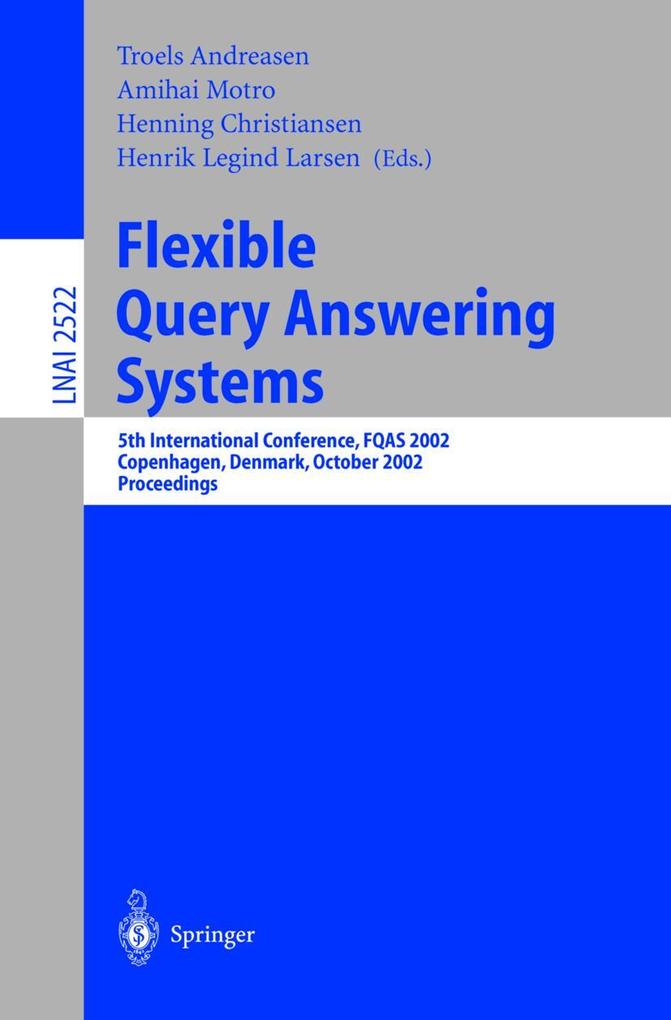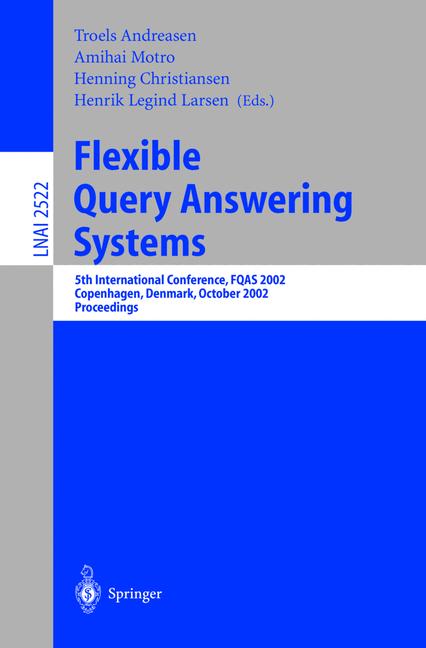
Zustellung: Sa, 05.07. - Di, 08.07.
Versand in 2 Tagen
VersandkostenfreiBestellen & in Filiale abholen:
ThisvolumeconstitutestheproceedingsoftheFifthInternationalConferenceon Flexible Query Answering Systems, FQAS 2002, held in Copenhagen, Denmark on October 27-29, 2002. FQAS is the premier conference for researchers and practitioners concerned with the vital task of providing easy, ? exible, and intuitive access to information for every type of need. This multidisciplinary conference draws on several re- arch areas, including databases, information retrieval, knowledge representation, soft computing, multimedia, and human-computer interaction. Previous FQAS events were held in 1994, 1996, 1998, and 2000. The overall theme of the FQAS conferences is innovative query systems - medatprovidingeasy, ? exible, andintuitiveaccesstoinformation. Suchsystems are intended to facilitate retrieval from information repositories such as data- ses, libraries, andtheWorld-WideWeb. Theserepositoriesaretypicallyequipped with standard query systems which are often inadequate, and the focus of FQAS is the development of query systems that are more expressive, informative, c- perative, and productive. These proceedings contain 29 original papers that relate to the topic of users posing queries and systems producing answers. The papers cover the ? elds: - tabase Management, Information Retrieval, Domain Modeling, Knowledge - presentation and Ontologies, Knowledge Discovery and Data Mining, Arti? cial Intelligence, Classical and Non-classical Logics, Computational Linguistics and Natural Language Processing, Multimedia Information Systems, and Human- Computer Interaction. We wish to thank the contributors for their excellent papers and the referees, publisher, and sponsors for their e? ort. Special thanks also to the invited sp- kers, members of the Advisory Board, and members of theProgram Committee. They made the success of FQAS 2002 possible.
Inhaltsverzeichnis
Context Sensitive Query Expansion Based on Fuzzy Clustering of Index Terms. - Intelligent Information Integration as a Constraint Handling Problem. - Effect Preservation as a Means for Achieving Update Consistency. - Recursive Queries in Product Databases. - A Class-Based Logic Language for Ontologies. - Consistent Answers from Integrated Data Sources. - A Knowledge-Based Query System for Biological Databases. - On Measuring Similarity for Conceptual Querying. - Representation & Querying of Temporal Conflict. - Adding Flexibility to Structure Similarity Queries on XML Data. - An Efficient Incremental Lower Bound Approach for Solving Approximate Nearest-Neighbor Problem of Complex Vague Queries. - Association Rule Extraction for Text Mining. - User Preference Information in Query Answering. - Bipolarity in Flexible Querying. - Theory of K-Calculuses as a Powerful and Flexible Mathematical Framework for Building Ontologies and Designing Natural Language Processing Systems. - X-Compass: An XML Agent for Supporting User Navigation on the Web. - A Parallel Spatial Join Processing for Distributed Spatial Databases. - Query Construction through Meaningful Suggestions of Terms. - An Augmented Visual Query Mechanism for Finding Patterns in Time Series Data. - Spatio-Temporal Querying in Video Databases. - A Similarity-Based Unification Model for Flexible Querying. - A Formal Model for Data Fusion. - Flexible Management of Consistency and Availability of Networked Data Replications. - Querying Multidatabase Systems Using SIQL. - Extending Relational Data Access Programming Libraries for Fuzziness: The fJDBC Framework. - Approximating Terminological Queries. - Conjunctive Aggregation of Extended Possibilistic Truth Values and Flexible Database Querying. - Interactive Query Formulation in SemistructuredDatabases. - Paraconsistent Query Answering Systems.
Produktdetails
Erscheinungsdatum
14. Oktober 2002
Sprache
englisch
Auflage
2002
Seitenanzahl
404
Reihe
Lecture Notes in Artificial Intelligence
Herausgegeben von
Troels Andreasen, Henning Christiansen, Henrik Legind Larsen, Amihai Motro
Verlag/Hersteller
Produktart
kartoniert
Abbildungen
XII, 392 p.
Gewicht
610 g
Größe (L/B/H)
235/155/22 mm
ISBN
9783540000747
Entdecken Sie mehr
Bewertungen
0 Bewertungen
Es wurden noch keine Bewertungen abgegeben. Schreiben Sie die erste Bewertung zu "Flexible Query Answering Systems" und helfen Sie damit anderen bei der Kaufentscheidung.










